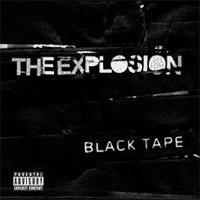
The Explosion
Black Tape (2004)
Jason Swearingen
The Explosion is not a revivalist band. They may have been at one point, but they no longer are. To lump them with revivalists would suggest that there was some level of calculated choice in the music they play. (And no matter how good Flash Flash Flash was, it felt like that at some points.)
So how is Black Tape? Simply put, it has teeth. It grabs the listener immediately, and it's grasp only gets stronger. Sure, it may be a polished record, but it is honest and, in turn, vicious.
Starting off, the record is hurt by how good a handful of the songs are (and how weak "Deliver Us" is as an opener). The anthemic, almost Cheap Trick-esque, "Here I Am" is instantly memorable, and that's the problem. There are a few songs on here that are so good, they make the others pale in comparison. As the record begins to sink in, however, the individual strengths of each song become readily apparent.
And the strengths of the songs come from the range of influences that this album claims. Obviously, the Buzzcocks influence is a constant presence, but this time it's not an overriding one. One interesting addition to The Explosion's sound is that of 60's and 70's rock. The sheer catchiness and the sing-a-long choruses that pervade the album would not have been possible without bands like Big Star and the aforementioned Cheap Trick. "Mothers Cry" even begins with a hint of country ala Social Distortion. "Grace" sounds like it could be a cover of a Rolling Stones song, and this is not a bad thing. Think "Rocky Horror Picture Show" without the irony.
Another intriguing aspect of Black Tape is the content of the lyrics. Save for a rerecorded version of "No Revolution" (which sounds grossly out of place, but, with a mention of its original appearance on Flash Flash Flash, it seems more likely to be a promotion of Jade Tree than a marketing ploy), the album lacks the almost sloganeering aspect of their previous work. With the contradictory statements of "I'm starting to see what's in it for me" on "Heavyweight" and "What are we getting out of this?" on "Hollywood Sign," the mood on this album is one of uncertainty. The lyrics tend to lean towards pleading, rather than demanding. There are a few exceptions, sometimes anemic compared to the album as a whole, and sometimes amazing ("Filthy Insane"). Even considering the great lyrical strides made on Black Tape, the lyrics are mostly what keep this album from being a ten. It is extremely difficult to have choruses like this record does and maintain impeccable verse, and, like many others, The Explosion couldn't do it. They are heartfelt lyrics, though, which does make up for the flaws, if only slightly.
Lastly, the musicianship of this album is a step up. Much of their older work suffered in that it felt like constructed patterns of a few chords rather than songs, and the presence of "No Revolution" only helps to point this out. Granted, they were very good patterns, but the songwriting here is seamless. You don't notice how they built the songs, just that they did a very good job doing it. The way the bridge leads into the chorus towards the end of "I Know" needs to be heard. It is powerful, to say the least. The main flaw of the album lies in the songwriting, however. There are parts where an only somewhat inspired verse is allowed to go for too long before a chorus breaks in, or, like in "Atrocity," an entire mediocre song kills the flow of an album better than it is. "Go Blank," although it is a good song, also ruins the flow. Whether it is the production or just the style, it seems out of place on the album, making tracks seven through nine ("Atrocity," "Go Blank" and "No Revolution") the major weak point of the album.
At points this album is both heavier and poppier than anything else The Explosion has done. It is by far the best songwriting of their career, with their weakest point being that they are definitely not an "album rock" band, due to their problems with maintaining a constant feel. While the good songs overshadow the lesser songs in the beginning, after a few listens, the lesser songs aid the great ones in standing out. The biggest help this album needs is the artwork. It's well done, of course, but it suffers from a major label budget without a theme. It's done in a collage style that looks pretty but lacks any permanent impact, which is the exact opposite of the music on Black Tape.